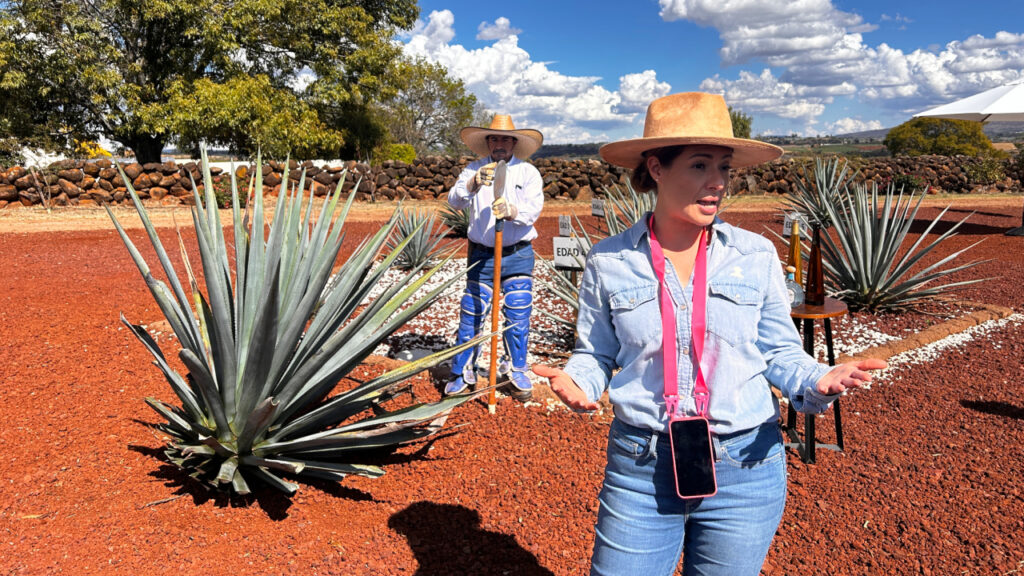
Meet the Badass Latina Who’s Revolutionizing the Bra Game for Those with Limited Mobility
A daily routine, including getting dressed, takes more effort for those with disabilities or limited dexterity. Something as foundational as putting on a bra can be challenging and painful.
Argentinian entrepreneur Nicole Cuervo realized this when she saw her grandmother Rosa’s painful, red indentations on her shoulders. During her college breaks, Cuervo would often visit her, and she inquired about the marks. Rosa told her that her chronic pain and arthritis in her hands made it difficult to put on her bra, causing the straps to dig into her skin.
“Mind you, she was a very capable and independent woman, even in her late 80s, so she wasn’t asking for help,” Cuervo tells FIERCE.

Cuervo decided to pursue a graduate degree to create a functional intimates brand for Rosa and others with limited mobility. Springrose—named after Cuervo’s grandmother—was launched with an adaptive, front closure bra ranging in sizes from 32B to 46F that can be put on eight different ways, promoting confidence and independence.
The founder and CEO tells us about starting Springrose during the COVID-19 pandemic, the traits from her culture that encourage her to stay positive as a business owner, and her startup tips for future jefas.
Setting out to solve a problem: lingerie-style
After having conversations with her grandmother in 2015, Cuervo decided to buy her an adaptive bra. However, she was dismayed by the limited options. She did more research among Rosa’s friends, who shared similar challenges when getting ready for the day.
When applying to graduate school programs, the idea of starting an intimates line stayed in the back of her mind. By July 2020, she was accepted to her dream MBA program at Northwestern University’s Kellogg School of Management. In addition, she was pursuing a master’s in design innovation at the McCormick School of Engineering. From there, she worked part-time on Springrose. Her professional design thinking and strategy background was her point of departure in solutions-oriented approaches.
Cuervo says that one of her biggest challenges when starting Springrose was a lack of knowledge about lingerie production. Her understanding of the apparel and lingerie world came together quickly. She researched how bras are made, the necessary stitching and components, and what else was essential to their development.

“It’s not a straightforward industry or space, and early on, I learned I’d started with the most difficult piece of apparel,” said Cuervo.
It’s true that the flagship product is meticulously made. They take anywhere from 20 to 48 components that are hand-sewn to approximate specifications – down to the millimeter. Fulfilling the technical support and coverage requirements into account is another thing.
Plus: “We were inventing a functionality no one had made before, and while it was exciting when it worked, it also made the development process more challenging,” added Cuervo.
Small things make all the difference in the product’s accessibility. For example, a velcro front closure that won’t interfere with pacemakers and optional O-rings for an easy grip.

Cuervo’s Latina culture gets her through all kinds of challenges
Even as she ventured into entrepreneurship during the onset of the COVID-19 pandemic, Cuervo remained resilient. Finding a manufacturing partner for Springrose’s special bras was a challenge amid the uncertainty of the global crisis. International travel was out of the question, so Cuervo was vetting several manufacturers virtually.
“Latinos are very gritty and resilient since opportunity [often] doesn’t come easy,” said Cuervo. “[My mom] taught me not to take no for an answer, especially if there’s something I really want. If you try hard, you will usually find a way, so I don’t give up unless I’ve exhausted all paths.”
Springrose worked with three different manufacturers over the course of two years until they found their current partners in Colombia.

When it came to the logistical side of the business, Cuervo learned the hard way that “no one will care as much about your business as you.” She says that setting clear expectations and timelines upfront with business partners is essential for entrepreneurs to always keep in mind. An incident where that wasn’t solidified cost her months of development and production of the bras.
“In business, particularly in a startup, something will go wrong at least once a week. It can be something small or big, but if you take it too personally or take it to heart, it can make it difficult to move forward. You lose your momentum and energy,” she explains. “However, if you can spin it into something positive or funny, then it’s easier to learn from it, let it go, and move on.”
At the end of the day, things she can’t change become funny stories that get her through other difficult times.
How Cuervo’s problem-solving expertise can help Latinas and their budding startup
For Latinas interested in creating something that will improve the lives of others, Cuervo recommends starting from the “pain point.” This way, you identify how your product will fit into your desired market instead of starting with the solution.
“People tend to assume they know the answer to a problem without asking for much validation, and then they end up trying to sell something no one wants,” said Cuervo. “The best way to start and succeed is to solve a real need. Often, there is no single solution to a problem, so you get to decide where you want to play, but always start from a need.”

Just like how she spoke to her grandmother Rosa and her friends, Cuervo says talking to as many people experiencing what you want to solve is the ideal place to start.
Asking short, open-ended questions about their life, pain, and what their dream solution looks like are appropriate starting points. “Dig into the details people share because that data will help you begin to form the solution you want to build,” said Cuervo.




